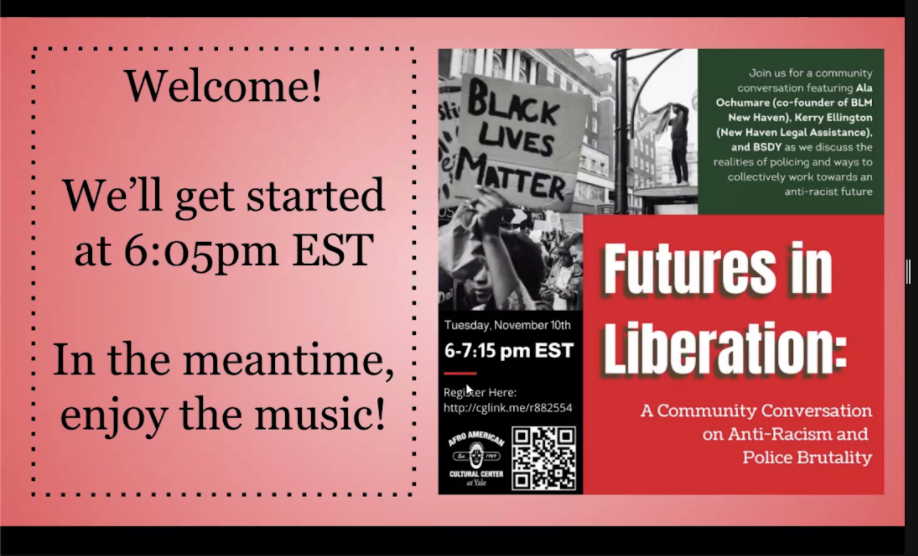
Courtesy of Zaporah Price
On Tuesday evening, 18 students and community members gathered via Zoom to discuss anti-racism and police brutality in a community conversation hosted by the Afro-American Cultural Center.
Co-founder of Black Lives Matter New Haven Ala Ochumare and New Haven Legal Assistance community organizer Kerry Ellington served as panelists for the event. The discussion was organized by Hajar Samih ’23 and Loren Bass-Sanford ’23, members of the Af-Am Cultural Center Intercultural and Social Justice Programming team. The panelists answered a series of questions on subjects ranging from police divestment in New Haven to the killing of Breonna Taylor, which sparked national outrage. The event also introduced community organizers to students in an effort “to collectively work towards an anti-racist future.”
“It’s really critical that this event be held at Yale so we can continue organizing to create the awareness that we need among the student body to engage in the conversation and the work moving forward and continuing around the call to defund the Yale Police and abolish the police,” Ellington told the News in an interview. “We shouldn’t be living in a police state.”
Ellington, who is an organizer with police-accountability group People Against Police Brutality, spoke at the event on the importance of educating community members on police divestment and public reinvestment into “Black and brown neighborhoods.”
A recent poll conducted by the American Civil Liberties Union in Connecticut, found that 63 percent of New Haven voters supported divesting 75 percent of the New Haven police budget and “re-investing those funds in public education and community-based violence prevention programs for youth.” The majority of those polled were voters of color, ACLU-CT reported.
As a member of the panel, Ochumare stressed the adoption of an anti-capitalist and queer framework to approach discussions on anti-racism. She explained that “isms” like racism and sexism are oppressive systems that are endemic to capitalism and require sustained anti-racist organization.
“What do we do in the community, it goes back to resocializing and rehumanizing ourselves around the fact that everyone gets to live, that everyone’s lives are valid … it doesn’t matter who I love, that has nothing to do with whether I should deserve to live or breathe, or whether I should have a place to live,” Ochumare told listeners.
According to Ochumare, high levels of police funding only add onto the experiences of discrimination faced by Black queer youth. She referred to queer people — specifically Black queer youth — who she said experience police harrassment and homelessness at high rates.
According to the Homelessness Policy Research Institute at the University of Southern California, an estimated 20 to 40 percent of homeless youth in America identify as LGBTQ+ despite comprising just 4 to 10 percent of the total youth population. Ochumare, who is queer, has experienced homelessness. She said she received little support from state institutions during that time and that services for the homeless are one area to which current police funds could be allocated.
Bass-Sanford told the News that the event was intended to provide Yale students an inspiring and safe space to discuss the racism and police brutality that has been amplified by the recent Black Lives Matter protests. She added that the event’s intimacy would allow students to support community organizers like Ochumare and Ellington.
“There really hasn’t been a time for us to come together and reflect on everything that has been going on over the past few months, so this is going to be a place where people can be in dialogue,” Bass-Sanford said. “With all of the protests going on, [we have to imagine] what does our future look like in an anti-racist world.”
Speakers at the event also highlighted the importance of Yale student involvement in these anti-racist efforts.
Co-President of Black Students for Disarmament at Yale Jaelen King ’22 spoke about BSDY’s push for police abolition on Yale’s campus.
One attendee, Jonathan Pierre ’24, said that the message from community organizers like Ochumare and King made him realize all the work that needs to be done.
“Going to this event today, I think it’s really made me realize just because I go to Yale doesn’t mean everything’s perfect,” Pierre told the News in an interview. “Yale is not immune from the tragedy that is racial inequality in our country.”
The Afro-American Cultural Center was established in 1969.
Talat Aman | talat.aman@yale.edu
Zaporah Price | zaporah.price@yale.edu







